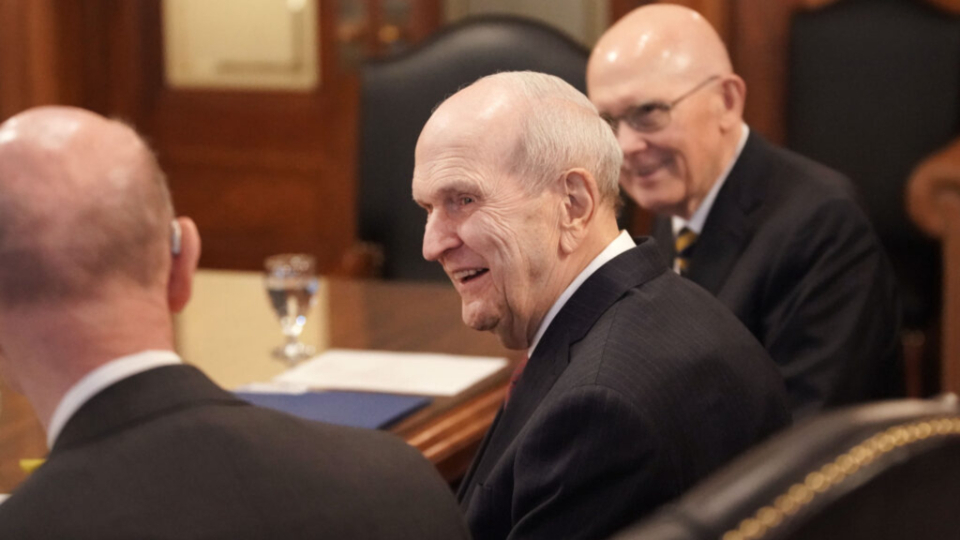
Church-Councils
President Russell M. Nelson and his counselors, President Dallin H. Oaks, first counselor, and President Henry B. Eyring, second counselor, attend a First Presidency meeting, held daily Tuesday through Friday, at the Church Administration Building in Salt Lake City on Wednesday, June 16, 2021. The Church Administration Building was constructed between 1913 and 1917. Photo by Jeffrey D. Allred, courtesy of Church News.Copyright 2021 Deseret News Publishing Company
This story appears here courtesy of TheChurchNews.com. It is not for use by other media.
By Rachel Sterzer Gibson, Church News
President Dallin H. Oaks has served beside President Russell M. Nelson for more than 37 years in the Quorum of the Twelve Apostles and now in the First Presidency of The Church of Jesus Christ of Latter-day Saints.
“What I have learned serving with President Nelson is that he is a different man when the mantle of the Lord settles upon him, and he becomes the Lord’s Prophet, the President of the restored Church, and the ultimate decision-maker in the Church,” said President Oaks, who has served as first counselor in the First Presidency since January 2018.
“I see him making decisions and giving counsel in a far different way than I saw in 34 years of sitting beside him in the Quorum of the Twelve.”
President Oaks described President Nelson as a visionary leader who helps all to see the end from the beginning. “He has a clear vision of when a subject requires patience and more discussion, but when the time is right, he makes decisions promptly and decisively,” President Oaks said.
As Sister Reyna I. Aburto, second counselor in the Relief Society general presidency, has participated in councils with President Nelson, she has observed how intensely he listens to each participant and values their contributions.
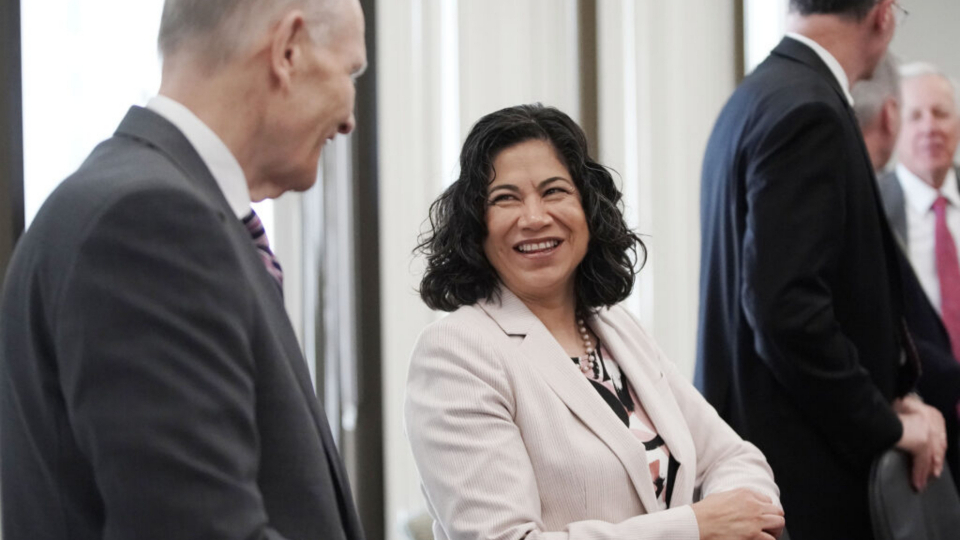
Church-Councils-part-4
Sister Reyna Isabel Aburto, second counselor of the Relief Society general presidency, talks with Elder Dale Renlund of the Quorum of the Twelve Apostles prior to a Temple and Family History Executive Council meeting at the Church Office Building in Salt Lake City on Wednesday, June 2, 2021. Photo by Jeffrey D. Allred, courtesy of Church News.Deseret News Publishing Company.
“He does what I imagine our Lord Jesus Christ would do: listen with love and with the desire to receive divine revelation in each council setting,” Sister Aburto said.
As part of a recent Church News series on the essential role of councils in the Church, Young Women General President Bonnie H. Cordon defined what it means to be an effective leader:
“Sometimes we think that effective leadership is somebody taking control and doing all of it. But really, effective leadership is the opportunity and the vision to counsel together and listen — and not just listen, but listen to learn what the Lord would like us to do.”
President Cordon was one of several Church leaders who highlighted principles of effective leadership, specifically within a council setting, and shared personal experiences to illustrate them.

Church-councils
Five members of the Missionary Executive Council — clockwise from top, Sister Amy A. Wright, President Bonnie H. Cordon, Elder Marcus B. Nash, Elder Dieter F. Uchtdorf and Elder D. Todd Christofferson — raise their hands in support of an item during a Missionary Executive Council meeting in Salt Lake City on Wednesday, May 26, 2021. Jordan Kesler, top left, and David N. Weidman, fourth from top left, are also present. Photo by Jeffrey D. Allred, courtesy of Church News.Copyright 2021 Deseret News Publishing Company.
An effective leader embraces the opportunity to counsel
During his career as a businessman, President M. Russell Ballard, Acting President of the Quorum of the Twelve Apostles, managed several successful companies. “They ran because of the expertise and good work of other good people,” he said. “So it is in the Church.”
“The council system is the way you move things safely and solidly from where it is to where it needs to be,” said President Ballard.
At Church headquarters in Salt Lake City, various councils and committees are organized under the direction of the First Presidency to direct specific aspects of the work. This pattern is replicated in stakes, wards and families.
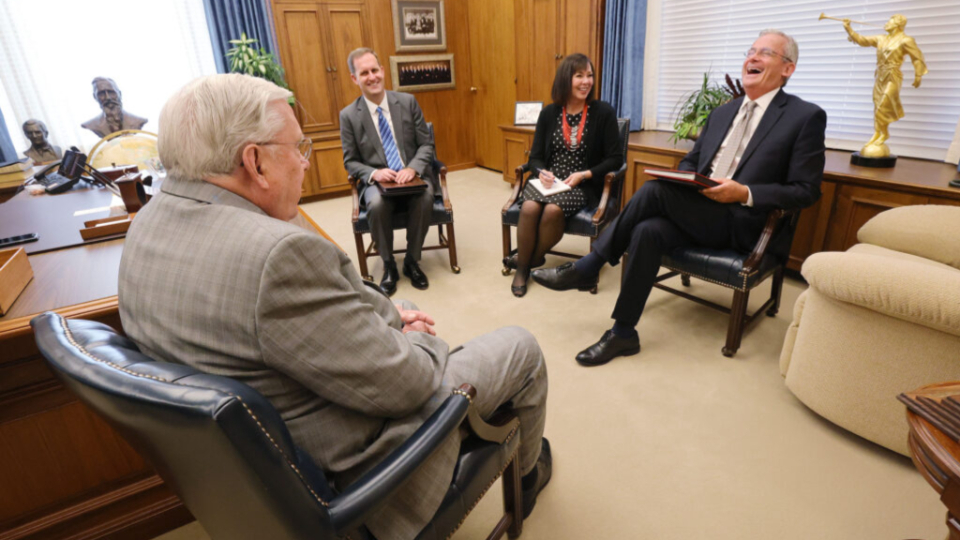
Church-councils
President M. Russell Ballard, Acting President of the Quorum of the Twelve Apostles, shares a laugh with Aaron Jenne, Suzanne Drysdale and Elder Patrick Kearon during a meeting at the Church Administration Building in Salt Lake City on Wednesday, May 12, 2021. Photo by Jeffrey D. Allred, courtesy of Church News.Copyright 2021 Deseret News Publishing Company.
In his 45 years as a general authority for the Church, President Ballard has participated in thousands of councils. Perhaps more than anyone, he has witnessed what works — and what doesn’t.
A council meeting is not telling everyone what to do nor asking everyone to give a report, he said. A council meeting is when a bishop says, for example: “We have a problem with reverence in the ward. Let’s talk about it. What can we do?”
Guided by the Spirit, the bishop seeks the input of each council member, and they counsel together about a solution. Once a decision is made that all feel comfortable with, they move forward and actively support it.
The primary mission of any Church or family council is “to bring souls unto Christ,” President Ballard said. “It is to help prepare them to receive the ordinances and covenants essential for eternal salvation.”
President Ballard said those who learn to counsel effectively will “always end up with a better result, always end up with a better answer, will always end up with a better spirit.”

councils-1.jpeg
Jeff Daly, second from left, and his wife, Kendyl Daly, right, hold a family council with their children in their Laguna Niguel, California, home on July 18, 2021. Photo by Alan Gibby, courtesy of Church News.All rights reserved.
An effective leader invites input from everyone
Relief Society General President Jean B. Bingham said a wise council leader recognizes that each member of the council has something valuable to contribute. When inviting input, he or she often waits to be the last person to share their thoughts to avoid unintentionally cutting off discussion.
“When we listen to learn, we are going to have a much better outcome than if we just wait until it’s our turn to speak,” she said.
President Cordon said she has learned a similar principle from some members of the Quorum of the Twelve Apostles. As they share their thoughts and ideas, “they say it in such a way that it continues to open suggestions, comments and insights from others. It doesn’t close down the conversation.”
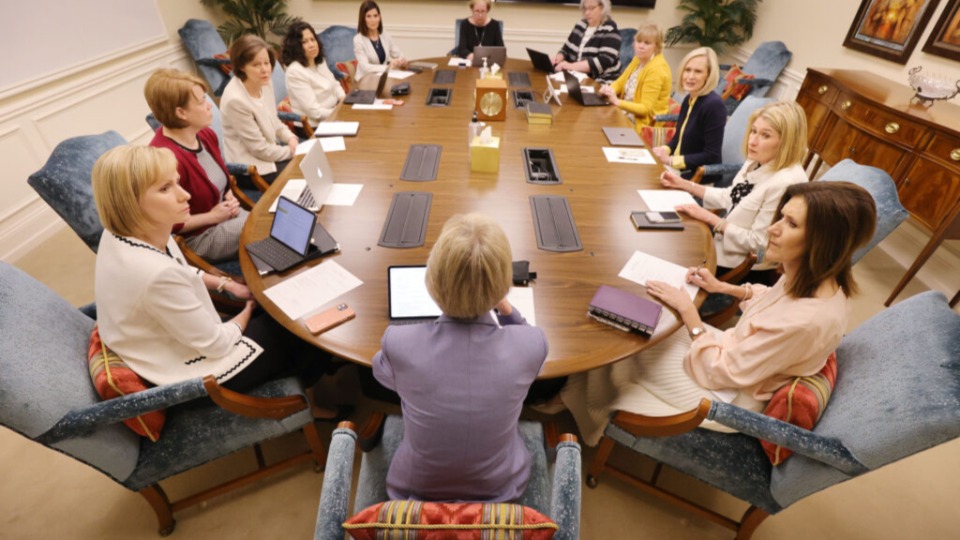
councils-3.jpg
Relief Society General President Jean B. Bingham, center front, leads a meeting for the Relief Society, Young Women and Primary general presidencies at the Relief Society Building in Salt Lake City on Tuesday, May 18, 2021. Photo by Jeffery D. Allred, courtesy of Church News. Copyright 2021 Deseret News Publishing Company.
By setting aside one’s own ideas and actively listening to learn — from others and from the Lord — “the Spirit increases our insights and understanding,” President Cordon said.
Inviting input from everyone also means being sensitive to those who haven’t voiced their opinions. Sometimes in the Young Women general advisory council meetings, President Cordon has noticed a sister who has been quiet. “I’ll invite her, ‘Do you have any thoughts?’ And sometimes she is exactly the missing piece that we were hoping to have,” she said.
An effective leader doesn’t force consensus
President Henry B. Eyring, second counselor in the First Presidency, remembers the first time he attended a meeting with the Quorum of the Twelve Apostles. Not yet an Apostle at the time, President Eyring was a guest at the meeting.
As he watched the Brethren discuss an item, “I thought they had reached, after a lot of differences of opinion, a consensus,” he recalled. “And the President of the Church who was in the chair said: ‘I sense there is someone in the room who is not settled yet. We’ll bring it back another time.’”
President Eyring said as they filed out of the room, he noticed a member of the Quorum of the Twelve Apostles tell the President of the Church, “Thank you.”
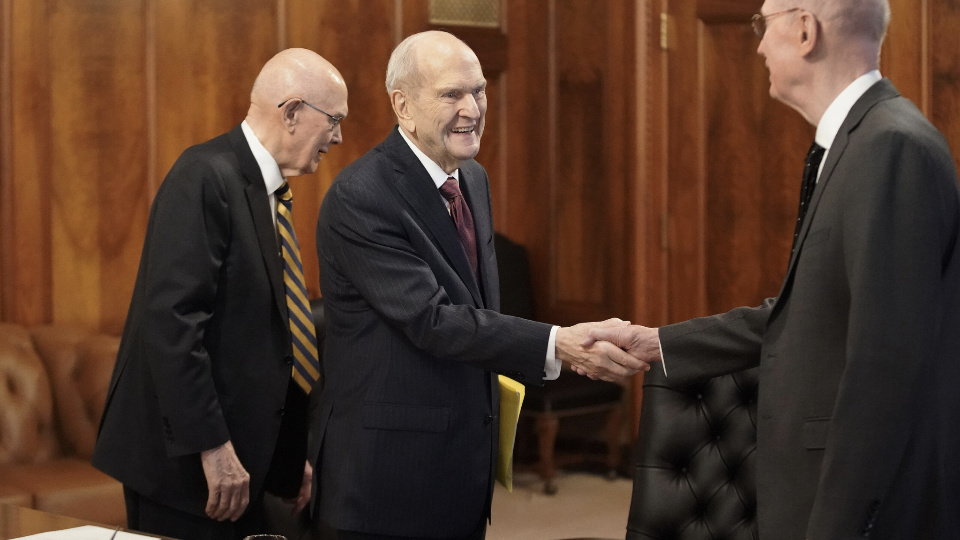
Councils,-part-1
President Russell M. Nelson of The Church of Jesus Christ of Latter-day Saints and his counselors in the First Presidency, President Dallin H. Oaks, first counselor, and President Henry B. Eyring, second counselor, attend their weekly First Presidency meeting at the Church Administration Building in Salt Lake City on Wednesday, June 16, 2021. Photo by Jeffrey D. Allred, courtesy of Church News. Copyright 2021 Deseret News Publishing Company.
Whether in a meeting with the Quorum of the Twelve Apostles, a stake presidency meeting or even a family council, “the great leader of a council is very sensitive to that — not to try to force unanimity or consensus but wait until it actually happens,” President Eyring said.
Elder David A. Bednar of the Quorum of the Twelve Apostles had a similar experience as a newly called Apostle. During one particular meeting, an item was presented by a senior member of the Quorum of the Twelve Apostles, and Elder Bednar had reservations about the timing that was proposed.
“He said, ‘Elder Bednar, what is it about the timing that concerns you?’ And I expressed my point of view,” Elder Bednar recalled. The senior member paused.
He then responded: “I have not fully considered the timing of this matter in the light you just suggested. Let’s reconsider this proposal and do some additional work.”
When the First Presidency and Quorum of the Twelve Apostles counsel together, Elder Bednar said, “no one ever will treat lightly a reservation or a comment by a fellow prophet, seer and revelator.”
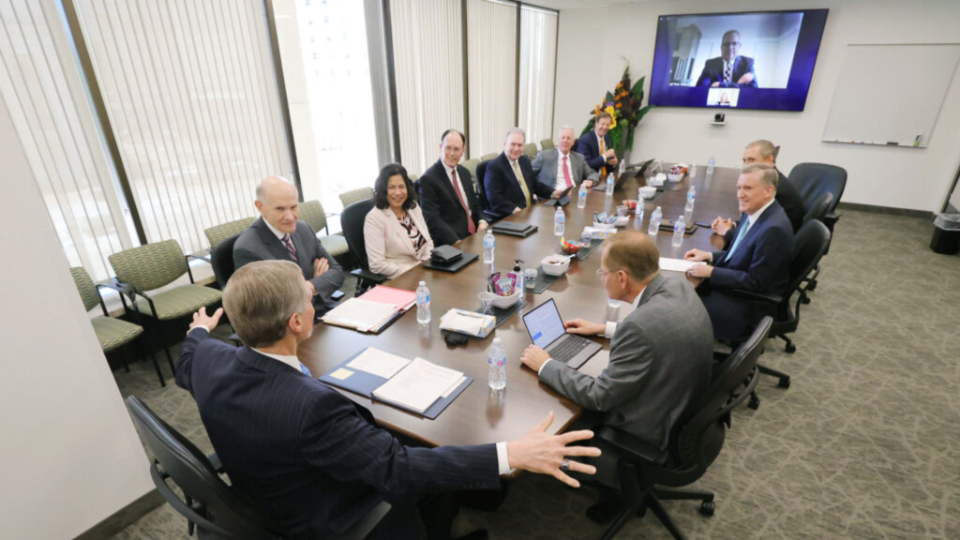
Church-councils
Elder David A. Bednar of the Quorum of the Twelve Apostles leads a Temple and Family History Executive Council meeting at the Church Office Building in Salt Lake City on Wednesday, June 2, 2021. Photo by Jeffrey D. Allred, courtesy of Church News.Copyright 2021 Deseret News Publishing Company.An effective leader ministers to the one
Shortly after she was sustained during the April 2021 general conference, Primary General President Camille N. Johnson received an assignment to serve on the Temple and Family History Executive Council.
“In a great act of kindness and benevolence, Elder Bednar invited me to his office with the two General Authority Seventies who are responsible for family history and temples, and gave me an overview of what our executive council was going to address,” she said. “What a blessing that was so that I went into that first meeting having some confidence about the subject matter that we were going to cover.”
Speaking one-on-one with a newly called leader before a stake council or ward council meeting could help them feel more included and confident in speaking up, she said.
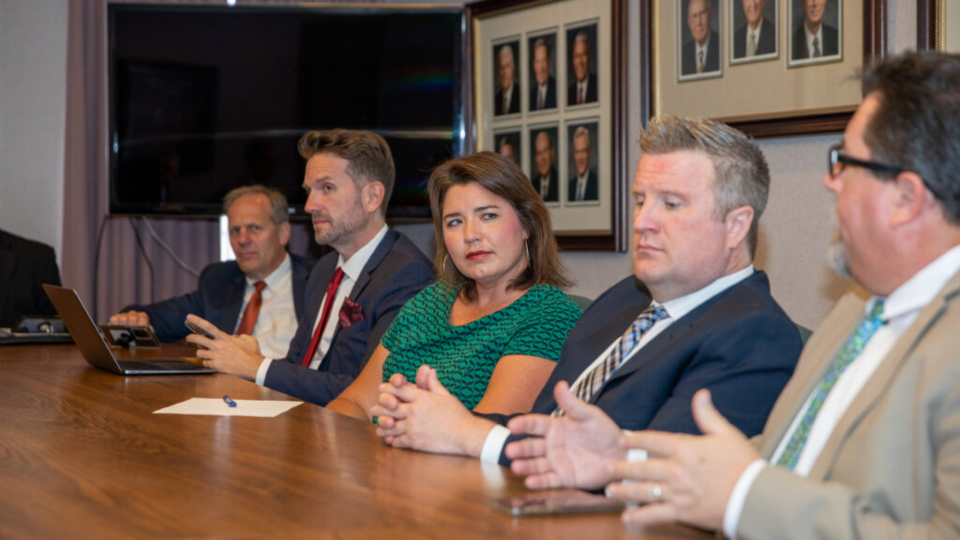
Church-Councils-part-4
Members of the Santa Margarita Ward council of the Rancho Santa Margarita Stake participate in a meeting on Sunday, June 27, 2021. Photo by Alan Gibby, courtesy of the Church News.All rights reserved.
President Johnson has also witnessed from personal experience that council members draw closer to each other as they draw closer to the Savior.
“These are not board meetings, where directions are given to executives to fulfill certain responsibilities or directives. Not at all. It’s a revelatory experience to identify what the Savior has in mind for His Church,” she said.
“This is more than just administration. This is ministering to the one. And the way we can know how to do that on a global basis is by inviting our Savior into that process and recognizing the Spirit.”
An effective leader fosters a spirit of unity
Elder Dieter F. Uchtdorf of the Quorum of the Twelve Apostles said when sitting in council with the First Presidency and Quorum of the Twelve Apostles, “we don’t represent countries or nationalities or professions. We represent the Lord Jesus Christ and His work.”
This mutual respect fosters an “equal level of discussion” — regardless of how long one has served in the council, he added.
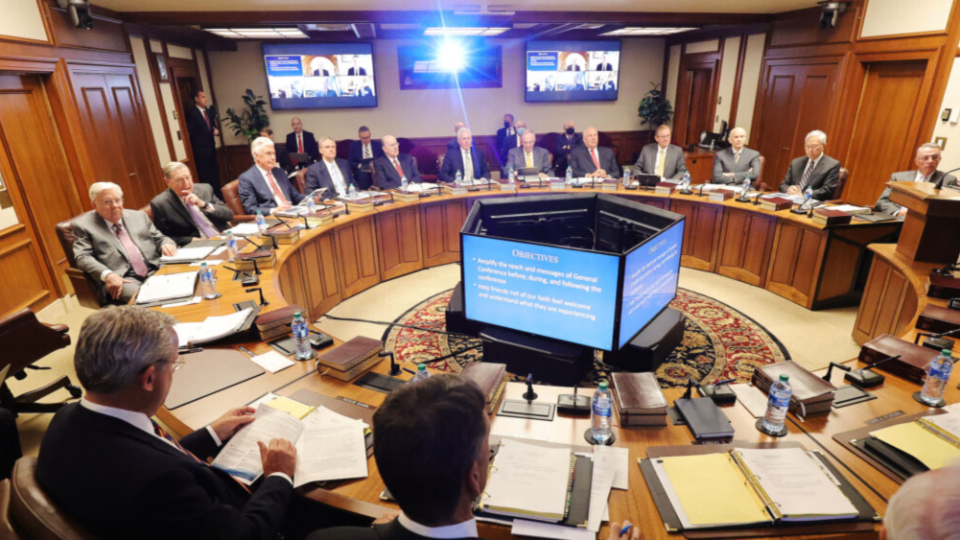
Church-Councils
The Quorum of the Twelve Apostles of The Church of Jesus Christ of Latter-day Saints gathers for their weekly meeting at the Church Administration Building in Salt Lake City on Tuesday, May 11, 2021. Photo by Jeffrey D. Allred, courtesy of Church News.Copyright 2021 Deseret News Publishing Company.
His fellow Apostle, Elder Quentin L. Cook, noted that because of this respect, there is often “a focus and spiritual power that comes” during open discussion with members of the First Presidency and Quorum of the Twelve Apostles.
“Suddenly everything from our history to our doctrine, the needs of the Saints, our being out in the world and meeting with the Saints all the time, comes into being. The Holy Ghost blesses us with incredibly strong impressions,” he said.
Elder Cook recalled that while serving on the Missionary Executive Council with President Ballard some years ago, President Ballard often extended invitations for others to weigh in on a discussion item.
“There’s a power in that,” Elder Cook said of seeking additional insights. “It may not be the direction it goes, but they are appreciated, and that builds unity. A council is a place to build unity.
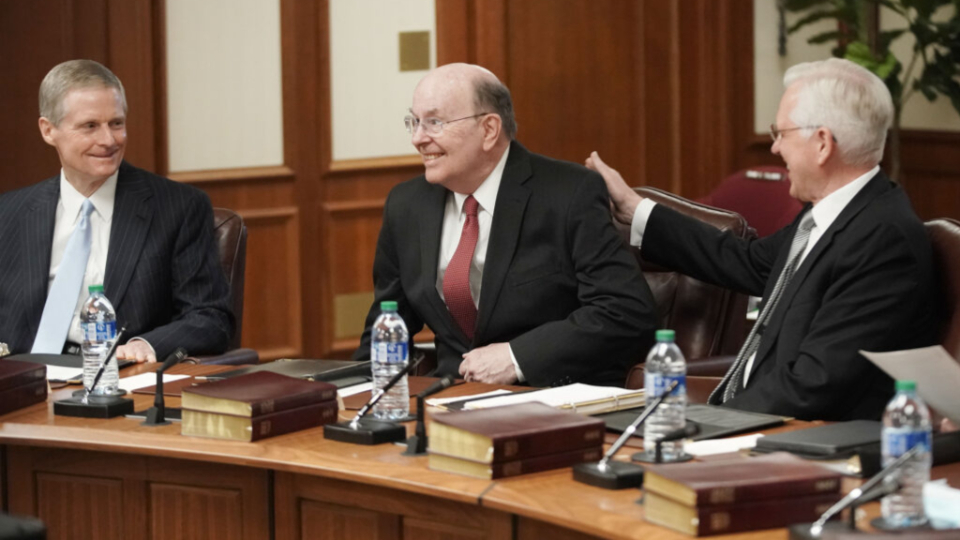
Church-councils
Elder David A. Bednar, Elder Quentin L. Cook and Elder D. Todd Christofferson greet each other prior to the Quorum of the Twelve Apostles’ weekly meeting at the Church Administration Building in Salt Lake City on Tuesday, May 11, 2021. Photo by Jeffrey D. Allred, courtesy of Church News.Copyright 2021 Deseret News Publishing Company
An effective leader serves with love
The heart of leadership — perfect leadership exemplified by the Savior Jesus Christ — is love, taught Elder Jeffrey R. Holland of the Quorum of the Twelve Apostles.
More important than organizational structures and corporate benchmarks, “it is people we love and people we lead,” he said.
“I think when you can see in people, when you can recognize in others, something you admire, it is very easy to praise them,” Elder Holland said. “It is very easy to encourage and appreciate them.”
Through His Atonement, the Savior exemplified the very meaning of love, and He invited His followers to love as He did. “A new commandment I give unto you, That ye love one another; as I have loved you, that ye also love one another” (John 13:34).
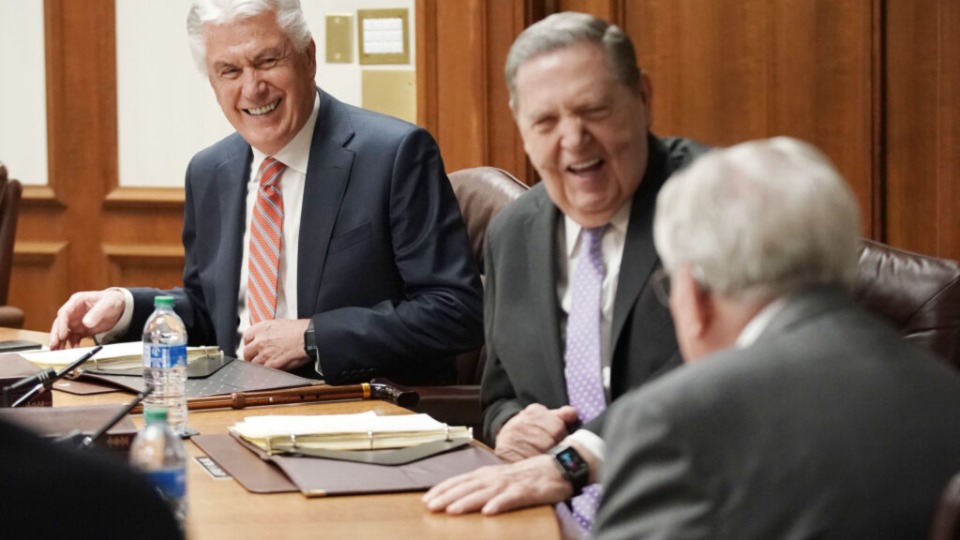
councils-2.jpg
Elder Jeffrey R. Holland and Elder Dieter F. Uchtdorf of the Quorum of the Twelve Apostles attend the Leadership and Planning Committee meeting at the Church Administration Building in Salt Lake City on Tuesday, May 11, 2021. Photo by Jeffery D. Allred, courtesy of Church News. Copyright 2021 Deseret News Publishing Company.Copyright 2021 Deseret News Publishing Company
